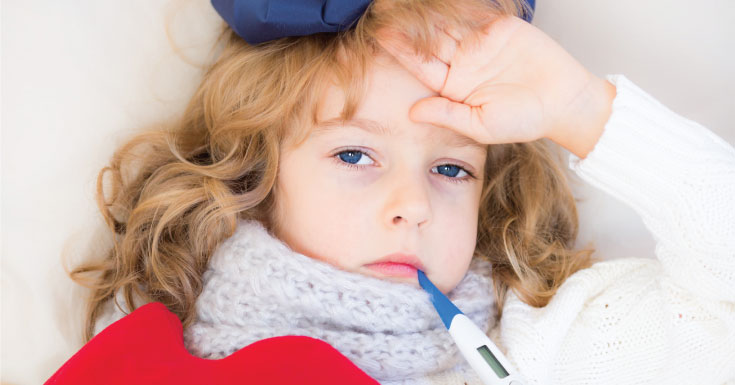What is fever?
Let us start with the simple basics, Fever means increased body temperature. This happens when your child’s body detects an illness, usually an infection, after which your child’s brain will reset its internal “thermostat” (temperature regulator). The body temperature then increases to activate the immune system to fight the illness.
Fever itself is not a disease, it is just a symptom letting us know something is happening.
Unfortunately, although fever is a natural body response, it can be scary for most parents. By learning simple actions to take at home, and knowing when to call your pediatrician, hopefully you can deal with your child’s fever with more confidence.
Conditions that can cause fever in kids
Most children have fever because of infections. These infections can range from mild to severe, depending on the location of the infection, and the type of germs causing the infections.
Other conditions that may also cause fever in children can be something as complicated as blood cancer, autoimmune disease, (one’s own body conducting self-destruction), or severe dehydration; or, even something as simple as overwrapping of a very young baby, or the body’s reaction following a vaccination.
How to take a child’s temperature?
You may notice your doctor and nurse commonly taking your child’s temperature using the “ear” thermometer, which may show less accurate results for babies younger than 6 months old, because of their narrow ear canals.
The “forehead” thermometer is much simpler and faster, and it is also safer during the pandemic, because it involves less body contact. However, it is easily influenced by the surrounding temperature, like hot weather, very cold air-conditioning, etc.
The “armpit” thermometer, which can also measure temperature from the mouth or the rectum, is much seldom used nowadays, even though results are most accurate when measured from the rectum. However, because of the discomfort, usually the armpit is used, delivering less accuracy. The old mercury-containing thermometers have since been replaced by digital ones, which are much safer and user-friendly.
Home remedies for treating fever in children
Fever medicines are easily available over the counter. There are different types and strengths. I would advise you to discuss with your doctor, nurse or pharmacist, in choosing the most suitable one for your child. Do be aware that the goal of the medicine is to keep the temperature lower, so your child feels less sick, but the medicine does not deal with the cause of the fever.
Wearing light clothing during fever will help your child to lose body heat faster. Keep the room temperature cool, but not too cold. Sponging during fever is still controversial – some studies showed it is not that effective, but many parents and health professionals still believe it works. Everyone agrees though, that only lukewarm water should be used. Water which is too cold may cause your child to shiver, resulting in heightened body temperature. Never use alcohol instead of water.
Your child may easily get dehydrated during a fever, so ensure plenty of fluids are given. Fluid-based food like yoghurt and popsicles are also good alternatives. Allow your child plenty of rest during a fever. It is advisable to stay away from school and childcare for at least one day.
When to seek medical attention
These simple guidelines will help parents recognise when it is time to bring their child to see a doctor or nurse:
- Babies younger than 3 months old with 38°C or higher
- Children 3 months old to 3 years old with 38.9°C or higher
- Children of any age with 40°C or higher
- Children with any chronic condition like heart disease, diabetes, cancer, weakened immune system, etc.
- Children with continuous fever lasting more than 72 hours or “off and on” fever lasting more than 7 days
- Children with unusual rash appearing during fever.
- Children who appear really sick and who are not their usual selves – refusing to drink, super fussy or fussier than usual, non-stop crying, has trouble being awake, refusing to play the whole day, etc
- Children with fever and seizures
If you are not sure, just consult your doctor or nurse anyway to be safe. They should be able to help you out.

Medical Director,
Paediatrician,
Pantai Hospital Cheras


